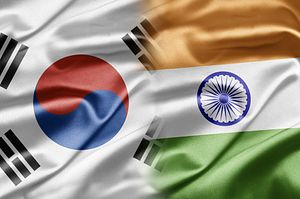After two consecutive years of below 5 percent economic growth, India’s new BJP government was inaugurated in May amidst cheers inside and outside the country, in anticipation that business friendly and reform-minded Prime Minister Narendra Modi could put the Indian economy back on track. As part of its commitment to return to substantial growth, the new government has taken the lead in building closer ties with the outside the world, and there has been a steady stream of high-level envoys including Chinese Foreign Minister Wang Yi and U.S. Secretary of State John Kerry.
With the improvement of foreign relations under Modi, a new light has been shed on relations between India and South Korea. As one of the earliest foreign investors after India’s economic liberalization in 1991, South Korea has been an aggressive yet enthusiastic investor that has continued to maintain its confidence in India’s potential. Bilateral trade is now 40 percent higher than it was in 2009, and South Korean companies including Samsung, LG and Hyundai are among the most respected companies in India, with strong commercial performance. Hoping to expand ties with India under the new government, President Park Geun Hye, who made her first foreign visit of 2014 to India, called Modi on July 22 to congratulate him on his victory in the general election and invited him to visit South Korea, which he accepted.
As highlighted by the recent phone conversation, as well as by the most recent joint statement between the two countries in January 2014, India and South Korea are looking to expand their strategic partnership by accelerating and further deepening political cooperation, economic engagement and cultural understanding. As India turns to the East for sources of growth and South Korea tries to diversify its oversea markets; and as India attempts to increase its global clout while South Korea seeks to strike a balance in the Northeast Asia; the need to strengthen the strategic partnership between the two countries is becoming even more pressing.
For South Korea, India carries considerable economic and geopolitical significance. Not only is India an emerging growth market driven by an abundant youth demographic and rapidly rising middle class, it can also be a bridge for Korean businesses to penetrate the Middle East and African markets, considering its long and historical engagement with these two regions. The Modi government’s reforms will provide greater market access for foreign investors, and it could be an important opportunity for Korean investors to strengthen the foundation of their business in the country.
South Korea can also benefit from science and technology cooperation with India. India’s strength in the software industry can complement South Korea’s global competitiveness in hardware, while India’s competence in space science and technology, as proved by the launch of Asia’s first mission to Mars in November 2013, can help South Korea to realize its goal of becoming an aerospace powerhouse.
On the geopolitical front, India, as an emerging global power, can contribute to ensuring stability in Asia by engaging in regional affairs and providing a mediating role, as well as rendering valuable support to South Korea on Korean peninsula issues.
For India, South Korea can be a reliable partner that can help to modernize India’s physical and social infrastructure – from roads to railways, and from schools to sewage treatment plants. In fact, Modi has been frequently mentioning South Korea in his speeches when stressing the importance of infrastructure for economic growth. With Korean investors already showing interests in the Modi government’s plan for a $4 to 5 billion infrastructure fund, cooperation in infrastructure will only help the Indian economy.
Manufacturing is another area where synergy can be amplified. Goldman Sachs recently published a report titled “How India Can Become the Next Korea,” and concluded that India should adopt the Korean model to boost its manufacturing, considering a remarkable resemblance between the current Indian economy and the South Korean economy of the 1970s. Hyundai Motors is one example of how a Korean car manufacturer has been making an immense contribution to India’s manufacturing sector as well as exports, by producing 600,000 cars a year and exporting 230,000 of them to more than 120 countries from its Chennai plant. With easier access to doing business in India under the new government, more Korean companies from a variety of sectors including defense, shipbuilding, garments, and electronic goods will be investing in India’s future by building factories, transferring commercial technology, and generating more local employment.
Lastly, South Korea can share its knowledge and expertise in skills development. The South Korean government’s promotion of export-oriented manufacturing industries has made its economic miracle possible, yet its heavy investment in education is another indispensable factor that is worth noting. In particular, technical and vocational education and training has been a key aspect of South Korea’s successful development. In this light, the recent partnership between Samsung and the Ministry of Micro, Small and Medium Enterprises to set up technical schools across India is welcome, and more initiatives and cooperation are to be encouraged.
In 2013, India and South Korea marked the 40th anniversary of diplomatic ties. Although it was only recently that the engagement between the two countries began to deepen, their relationship has proven beneficial in many different areas. With the new Modi government, there is now a greater expectation and enthusiasm for stronger ties between the two countries, and that opportunity should be seized. The next five years will be an interesting, yet immensely critical period for a sleeping elephant to wake up from its dream, and an ally would be of great help.
Soyen Park is a senior researcher in the economic section at the Embassy of the Republic of Korea in India and a Ph.d Candidate at Korean University. The views expressed in this article are those of the author and do not necessarily represent the views of, and should not be attributed to, the Korean Embassy in India or the South Korean government.

































